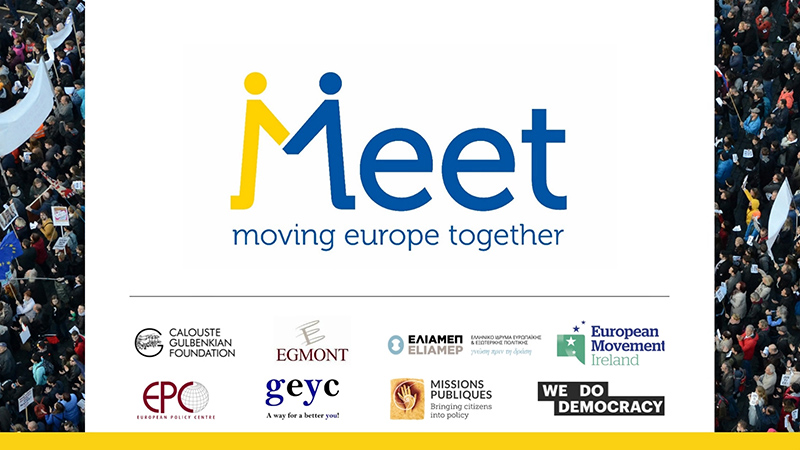BACKGROUND AND OBJECTIVE:
Initiated by the European Policy Centre, the Moving EuropE Together (MEET) project will run in parallel to the Conference on the Future of Europe and will interact with it, connecting citizens, ideas and policies across borders. Indeed, despite its participatory intentions, the Conference on the Future of Europe does not play on the local scales of its member states. It is however essential that these territories also take part in the debate on the future of Europe, by mobilizing their inhabitants so that their voice is heard. The European Policy Center relies on a network of civil society organizations in 8 Member States. In order to address these territorial inequalities within the European deliberative process, “local citizens’ agoras” will be financed to make the voice of the territories heard. A space for dialogue between citizens and their MEPs, present during the participatory process, will also be set up. The MEPs will then be invited to bring the recommendations to the European Parliament.

MODALITIES OF THE MISSION:
Missions Publiques is organizing the implementation of two local citizens’ agoras in France and two local agoras in Germany. The latter are composed of 15-25 citizens, representative of the geographical specificities of the region. Each “local citizens’ agora” applies a participation rate of people from the “Diversity” category that amounts to a minimum of 20%. The themes of the agoras are based on those of the panels of the Conference on the Future of Europe:
- Democracy and European Values, Security and Rule of Law
- Climate change, environment and health
- Economy, social justice, employment, education, youth, culture, sport, digital
- EU in the world, migration
ADDED VALUE OF THE APPROACH :
The agoras aim to strengthen the impact and influence of local authorities in the Conference on the Future of Europe process. By encouraging citizen participation, local authorities open the way to a tangible opportunity for citizens to influence the European decision-making process which, in an ambitious perspective, could pave the way for sustainable reforms of the European Union.
This approach is also in line with the political and institutional will of the European Parliament, which is taking the opportunity to forge stronger links between its institution, its members and its citizens in the territories.
Often unknown to the general public, MEPs are a useful vector in the process to demonstrate the synergies that can be created between traditional representative democracy and participatory democracy in a cooperative approach.
Read more:
“By involving MEPs into the Agoras, they will feel a closer connection to their constituencies”
Our interview with Paul Butcher and Johannes Greubel both Policy Analysts at the European Policy Center



